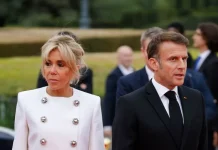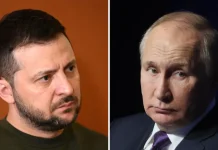The European Commission has rebuked Germany for unilaterally pledging £6 billion in aid for Ukraine in the latest twist in a row between Paris and Berlin over support for Kyiv.
Thierry Breton, the internal market commissioner, attacked Olaf Scholz for not committing the money to the EU’s European Peace Facility weapons fund for Volodymyr Zelensky’s army, which diplomats in Brussels said on Thursday was a symptom of strained relations between France and Germany.
“We see that Germany is trying to go solo, it hasn’t fooled anyone, and in particular it is trying to stop supporting the European Peace Facility,” Mr Breton, who was chosen by Emmanuel Macron
His comments come a week after Olaf Scholz said EU member states weren’t doing enough to support Ukraine in a thinly veiled swipe at Mr Macron, whose support is dwarfed by Germany’s.
The EU is further divided between those governments supportive of Mr Scholz’s call and those anxious he will derail the European Peace Facility, which allows states to claim back for hardware sent to Kyiv, diplomats in Brussels said.
The relationship between France and Germany, the EU’s two most influential countries, was already tense after spats over energy subsidies, Chinese electric car imports and defence policy.
“A broader group of member states don’t mind Scholz urging them to do more. That urging stings for France, which hasn’t done as much. Hence Breton’s rebuke,” an EU diplomat told the Telegraph.
Germany is Ukraine’s second-largest international backer behind the US, where Joe Biden’s plans for further aid are being blocked by Republicans in Congress.
Berlin is seeking to reduce its contributions to the £20 billion European Peace Facility.
It argues its bilateral contributions to Ukraine should count against what it is expected to pay into the fund.
Germany, the EU’s largest economy, provides about a quarter of the war chest, which has provided Kyiv with €4.5 billion in weaponry and trained more than 30,000 recruits.
But it is also facing a €17 billion budget black hole after a constitutional court said moving €60 billion of unused coronavirus recovery money to Germany’s Net Zero plans was illegal.
France’s bilateral contributions are far lower than Germany’s because of Paris’ use of the scheme.
Paris has donated just €544 million in military aid directly to Ukraine since the start of the invasion, according to a tracker maintained by the Kiel Institute
Germany donated €17.1 billion, the second largest amount after the US, followed by the UK with €6.6 billion, according to the Kiel Institute.
Mr Macron announced plans for more bilateral support for Ukraine on Tuesday night, including 40 Scalp “storm shadow” long-range missiles, worth about €55 million, and “several hundred” bombs.
The French president said he would sign a bilateral security agreement with Mr Zelensky to “continue to help Ukraine to hold the front line and protect its skies” during a visit to Ukraine next month.
It comes after Rishi Sunak promised Ukraine €3 billion in military aid over the next two years during his visit to Kyiv earlier this month.
Meanwhile, Latvia is leading a coalition of Western countries to arm Ukraine with “thousands” of crucial drones.
Andris Spruds, defence minister, said on Tuesday that 20 countries have now signed up.
In contrast, the EU’s two most pro-Russian leaders, Hungary’s Viktor Orban and Slovakia’s Robert Fico, met for talks in Budapest.
Mr Orban is blocking a €50 billion EU aid package to Ukraine, while Mr Fico was elected last year on a campaign promise not to send another bullet to Kyiv.
“Ukraine does not have a military solution, and the current strategy is not working,” Mr Fico told reporters on Wednesday after a meeting in which the two leaders pledged to support each other.












